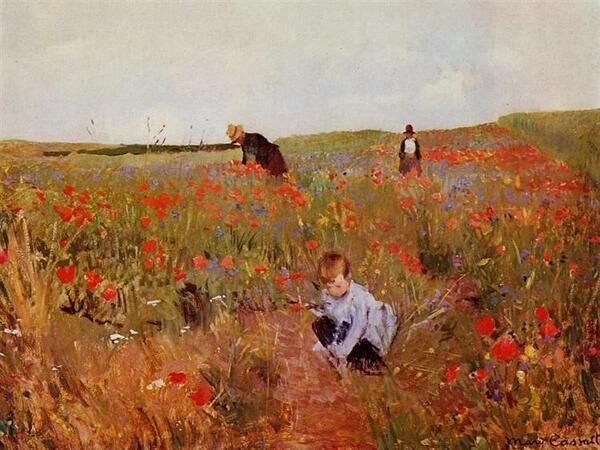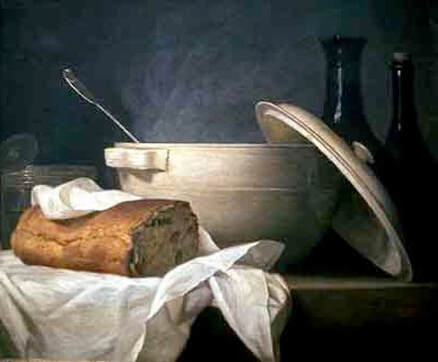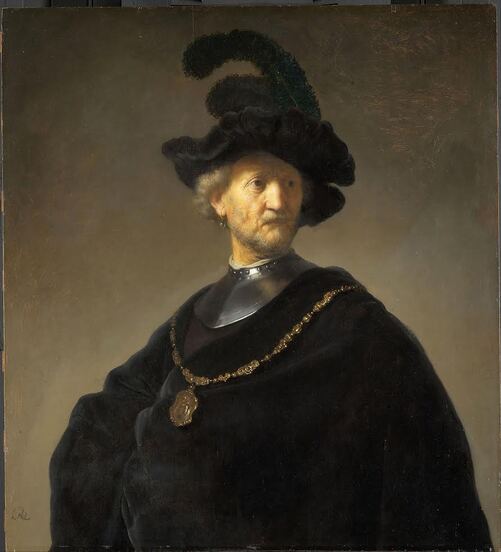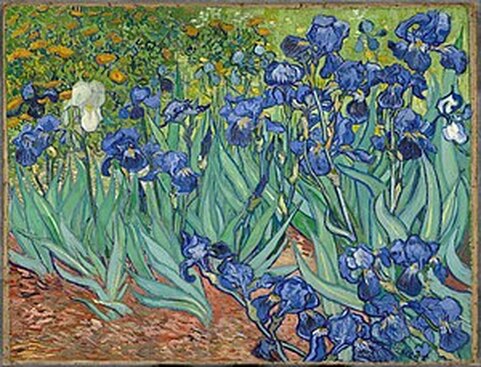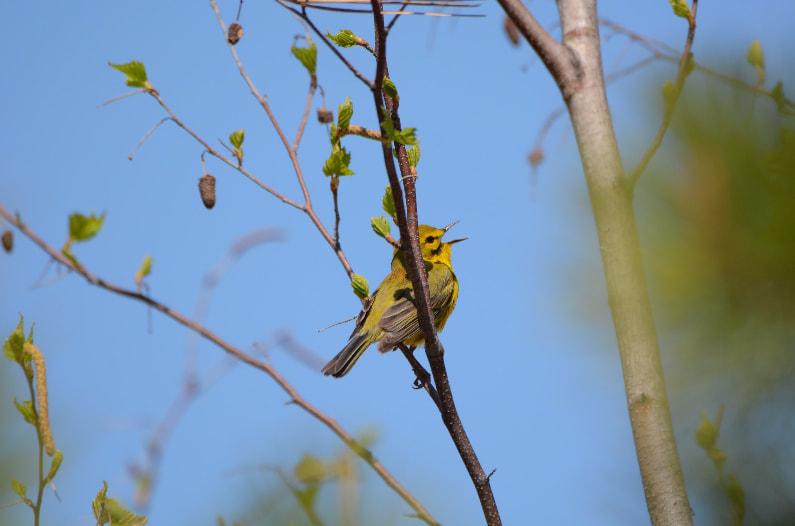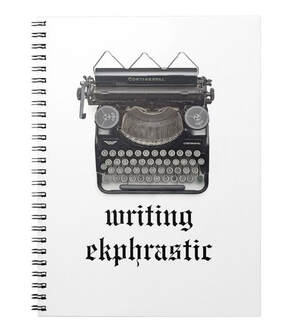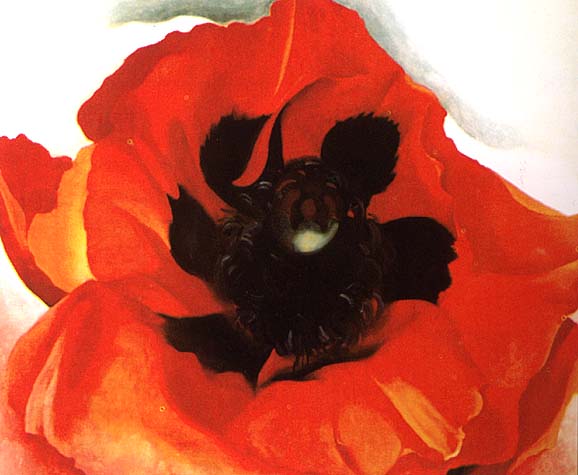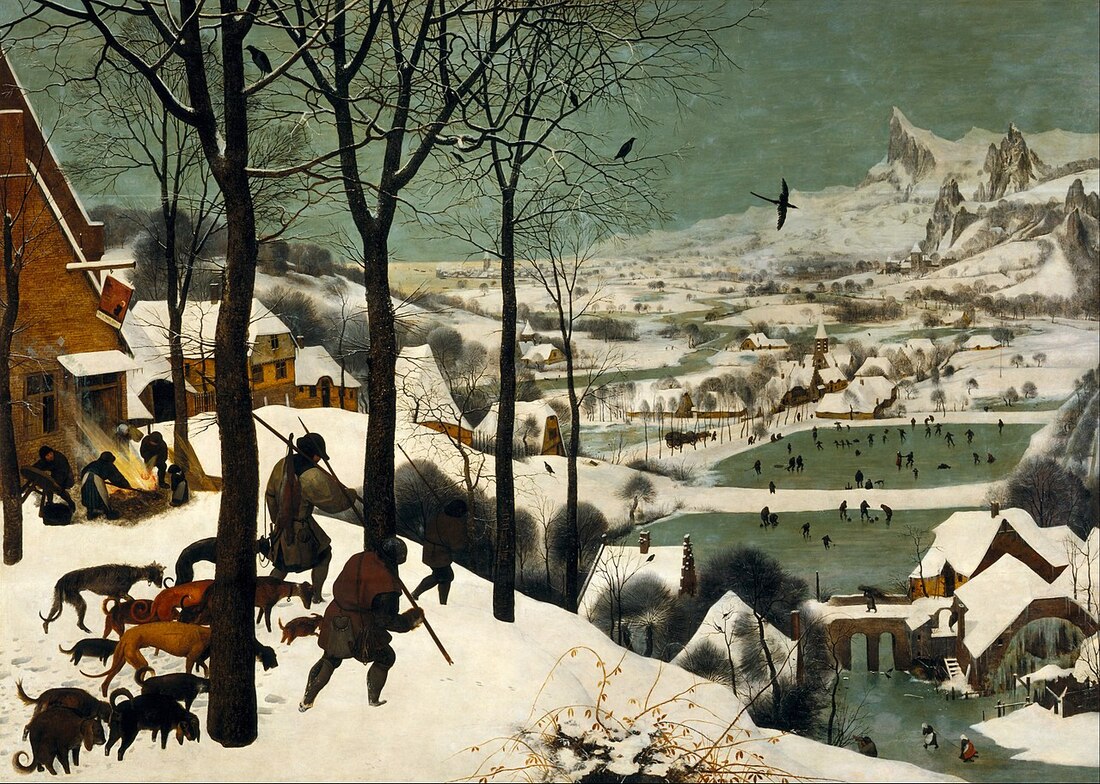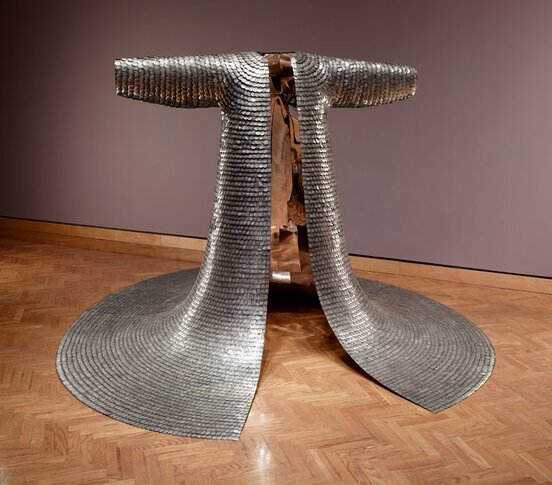|
Living With What I Cannot Find I can’t tell you the pleasures of the world. That is something you must walk into, bobbing red heads of flowers, whispers of yellow, white, and blue, the lace of green leaves beneath your feet. Cities grow unseen past the horizon, quick as an ache. But I can tell you I remember my mother, my grandmother, my sister digging for the roots. They want to transplant the beauty of living things, to spread the paint of one hillside upon another. But sometimes beauty does not hold. Soil is not the same from one plot to another. Listen to me, speaking of ideals as though everything is as simple as a dwindling sky, a few lingering clouds, a modest shadow on the hill in the distance. I can’t tell you what made me say those things. Maybe the tall grass behind me says what I want to hear, tells me a day like this is all I need. If you want to find me, you can, out beyond the edges of this perfect world. David B. Prather David B. Prather studied creative writing at Warren Wilson College. His debut collection of poetry, We Were Birds, is forthcoming from Main Street Rag Publishing. His work has appeared in several online and print journals, including Prairie Schooner, Colorado Review, Poet Lore, The Literary Review, The American Journal of Poetry, The Sunflower Review, Gyroscope Review, and many others. He lives in Parkersburg, WV.
0 Comments
Silver Spoon in a Tureen Grey and taupe variations on the cream of white make you stare at the surface of bowl and folds of linen. A glass vessel holds salt for the bread. The soup is mushroom scoured below trees in the forest-- forms rounded in desire. Slice open the crust on the limestone table and eat. Kyle Laws Kyle Laws is based out of the Arts Alliance Studios Community in Pueblo, CO where she directs Line/Circle: Women Poets in Performance. Her collections include Ride the Pink Horse (Stubborn Mule Press, 2019), Faces of Fishing Creek (Middle Creek Publishing, 2018), This Town: Poems of Correspondence with Jared Smith (Liquid Light Press, 2017), So Bright to Blind (Five Oaks Press, 2015), and Wildwood (Lummox Press, 2014). With six nominations for a Pushcart Prize, her poems and essays have appeared in magazines and anthologies in the U.S., U.K., Canada, and France. Granted residencies in poetry from the Massachusetts Museum of Contemporary Art (MASS MoCA), she is one of eight members of the Boiler House Poets who perform and study at the museum. She is the editor and publisher of Casa de Cinco Hermanas Press. ** Packing Up When my mother went into a home and we were left to pack up hers, all my Florida sister wanted was the Pyrex casserole, the one that held weekly tuna noodle casseroles, summer ambrosia salads, lunchtime macaroni and cheese—even the kind with little pieces of hot dogs we kids didn’t like—and those terrible jello salads. In that bowl, transparent and large, we three sisters learned to cook, mixing cookies and pancakes, soaking fruit for pies, and covering mom’s famous Sunday dinner roll dough with a damp tea towel leaving it to rise while mom sang all the while over the potatoes on the stove. My brother had packed it—so fast!—in with all the other pots and pans, the holiday mugs and water glasses and colanders, all the potato mashers. So many boxes, ceiling high and heavy. I opened every one until I found it. But even after I shipped it off, as dull and scratched as ever after 45 years, I still cried for the Wrigley soup noodles made there with flour and good Amish butter. That recipe is one I never got and one she’ll never remember now. “The soup in this place is simply terrible,” my mother says. “You’d think by now they would have learned how to cook.” Kate Bowers Kate is a Pittsburgh based writer who works for a public school system and has a terrible habit of reading everything she sees that contains print, including roadside signs and the backs of other people’s cereal boxes. She has been published in The Ekphrastic Review previously and enjoys the challenges the Review offers writers. ** Still Life I think I shall paint a still life. Perhaps a still still life dead still unmoving unconnected to life set up for its decorative value to the viewer or the challenges it presents to the artist. Or should I still try to capture life a life once lived a meal once eaten or a life passed into the present still alive waiting as long as it can stay still and not move into a future life, a still to come life a meal still to be partaken. That’s what I’ll paint while there still is life. Lynn White Lynn White lives in north Wales. Her work is influenced by issues of social justice and events, places and people she has known or imagined. She is especially interested in exploring the boundaries of dream, fantasy and reality. She was shortlisted in the Theatre Cloud 'War Poetry for Today' competition and has been nominated for a Pushcart Prize and a Rhysling Award. Her poetry has appeared in many publications including: Apogee, Firewords, Vagabond Press, Light Journal and So It Goes Journal. lynnwhitepoetry.blogspot.com www.facebook.com/Lynn-White-Poetry-1603675983213077/ ** Potage Parmentier, Light, and La jatte blanche Steam rises above the soup tureen, so aromatic, I could lift the ladle, pour myself a bowl. A perfect blend of leeks and potatoes, a dash of salt, a slow simmer until all is velouté. The painting breathes beyond Vallayer’s allotted genre. Still life. Her glass ceiling as a woman in the old boys’ Académie Royale. And she excelled, a commercial success with her dead-eyed mackerel, pheasants hung to ferment, flowers fresh as dew. Light bounces off the white bowl and cloth, cradling a baguette’s crusty temptation. So life-like I could tear a morsel and dip it in the piping hot soup. So animated, Diderot called her precision “imitative magic.” Was nature morte really a glass ceiling for Vallayer, a woman definitely of her time, not mine? I fancy her content, deemed gifted in artful composition where her eighteenth- century sentiments could be devoted to colour, form, and light. Sandi Stromberg Sandi Stromberg is a juried poet in the annual Houston Poetry Fest for the eleventh year. She recently had a poem chosen for Waco WORDFEST’s water-themed anthology. In addition, her three submissions to the Third Annual Friendswood Library Ekphrastic Reading and Contest were selected for the September reading and publication in the forth-coming anthology. ** Found Objects She has no legacy, no inheritance. Only a box of photos of her ghosts. Her grandmother and mother dead, their possessions dispersed or lost. She yearns to hold something of theirs, to grip a ring or brush, to swirl a shawl around her shoulders, to turn the pages of their books. Today, on a mid-August morning, she walks toward the park, passes a yard sale, halts, turns back. There, on a flimsy card table, a soup bowl, large and round, dulled white, chipped on the rim, but sturdy, still capable of holding heat. She imagines it on her counter as a stockpot simmers with chicken, carrots, onion and celery, its scent heady like wine. She imagines baking bread, kneading dough, adding raisins and allspice, its fragrance slipping from the oven. The scene is clear. Her table set, grandmother and mother returned from the World to Come. They sit, eyes alert, lips curved, spoons in hands. Wait for her to bring bread on a platter with sweet softened butter. Wait for the soup bowl, warm in her hands, heavy with love. Valerie Bacharach Valerie Bacharach’s poetry has appeared in publications including Pittsburgh Poetry Review Pittsburgh Quarterly, US 1 Worksheets, The Tishman Review, Topology Magazine, Poetica, and The Ekphrastic Review. She is currently pursuing her MFA in poetry at Carlow University and is a member of the Madwomen in the Attic workshops. Her first chapbook, Fireweed, was published in August 2018 by Main Street Rag. ** Solstice Lamps flickered and waned as the men from Duquesne Light worked to repair a failed transformer. Cobwebs on the dusty candles sizzled in their flame, leaning towards each other in ill-fitting candelabras, a gift from an anniversary long past. Slices of pink and tender ham were passed beneath flickering shadows. Butter clung to steamed cabbage like an embrace and the lima beans shucked their coats of translucent skin. Presents were opened in the checkerboard kitchen near benevolent windows reflecting in light. As the last package was opened electricity sang like a familiar carol bidding the darkness to fly away. Janette Schafer Janette Schafer is a writer, nature photographer, part-time rocker, and full-time banker living in Pittsburgh, Pennsylvania. Her writing and photographs have appeared in numerous journals, magazines, newspapers, and websites. She is co-editor of The Dreamers Anthology, released by Beautiful Cadaver Project Pittsburgh in April 2019. Her poem "What we want to remember about this river" was the 2019 winner of Laurie Mansell Reich/Academy of American Poets prize. ** A Maasai Art Student Feels Homesick in Paris Not your sooted sufuria, charcoal ingrained in its dented base. Not your wooden spoon, rough-hewn from the neighbour’s acacia. Not your gourds full of cow’s milk and blood with goatskin handles. Not your soup, eked out with thin strips of bark and a vegetable or meat chunk if we were lucky. This is dressed in crisp linen, a clean white bowl, silver-served and glinting in the gleam of light, laid out with the lid off and bottle uncorked next to the crusted golden bread. Yet the steam and the twinge in my stomach take me straight back to you. Helen Freeman Helen has been published in several online magazines and supplements including with Corbel Stone Press, Ink, Sweat and Tears, Clear Poetry, Algebra of Owls, Ground Poetry, Your One Phone-call, Open Mouse, Red River Review, Barren Magazine, The Drabble, Sukoon and The Ekphrastic Review. She lives in England. ** White Soup Bowl Are the holes flavour-related? Flavour adjacent? Or perhaps a flavour impetus, the pompatus of taste? It’s my first time making bread. Soup is old hat. The dough on the third day – it will rise. Will it rise again if it deflates, flattens out, gives a torn damnation? When dipping is there a consistency or variable that guarantees butter isn’t needed? Well, let’s use it anyway. The salty dogs pant under the splintered table. Steam and yeast wait for no one. The soup will taste like an old hat if you leave the lid ajar like a god or gangster. Excessive celery erases dreams. Could be the wine. Probably it’s the wine. It’s the wine. Will you pick crumbs from my beard forever? JR Walsh R Walsh was born in Syracuse, NY and lives in Boise, Idaho. He received his MFA in Creative Writing from Boise State University, where he now teaches English as a Second Language. He is the Online/Fiction Editor at The Citron Review. His writing is found in many fine publications, such as Rougarou, Timber, Juked, Grey Sparrow Journal, Alice Blue, Timshel, Esquire, and B O D Y. For more: itsjrwalsh.com. ** By All Her Womanly Charms In wintertime what could be better Then a warm home-cooked cob of bread A hearty parsnip, turnip mutton stew And a glass or two of heady mead before bed. It’s the kind of nostalgia That takes out life’s game-shot lead And fills your heart full-fed A dumpling or two, And a well-bosomed lass to lift your soul Above a near-empty glass; What more could any man wish or ask? After a hard day’s work; has -taken his every-sinew too task. Then to just-sleep, sleep likes a babe in arms. And know no other qualms, Other then he’s well-suited Well cared for, by all her womanly charms. Mark Andrew Heathcote Mark Andrew Heathcote is from Manchester in the UK, author of In Perpetuity and Back on Earth, two books of poems published by a CTU publishing group ~ Creative Talents Unleashed and in creative charge, the direction of two anthologies by the same publisher. He's an adult learning difficulties support worker, who began writing poetry at an early age at school. Mark enjoys spending his leisure time off work reading and writing and spending time gardening. https://www.ctupublishinggroup.com/mark-andrew-heathcote.html ** Half the Loaf... Such irony is so well done, your steaming bowl as smoking gun of greater talent not resigned to be by lesser thus confined to stillness in which brush compelled would find its rightful fame withheld, not measured by the weight of worth but gender to which given birth. Your bowl will have the final word deposed by time as witness heard for praise no longer left unearned when table is more fairly turned and half the loaf so well you've done will see the day your point is won. Portly Bard Portly Bard: Old man. Ekphrastic fan. Prefers to craft with sole intent of verse becoming complement... ...and by such homage being lent... ideally also compliment. ** The Seaweed Soup Sea Whistle? A broth of Dead Man's Rope? A fusion of Fucus flavours: Bladderwrack, Spiral Wrack, Channelled Wrack, Serrated Wrack? Or perhaps a mash of Devil's Apron/ bulbous prongs of Velvet Horn? Something named only in Gaelic with a little garlic? Each summer evening, after a long Atlantic swim, with no skins, cook and try the day's new find, ranging ever further out onto rarely visited skerries of taste. Bruach Mhor Bruach Mhor lives by a loch. He is transitioing into a seal. His poems have most recently appeared in Ink, Sweat and Tears and The Lake, Morphrog, Poetry Village, Plumwood Mountain and Emerald (Monstrous Regiment Publishing, Edinburgh) ** The Cooking Pot It is a very heavy cooking pot made of twice-baked clay. Do you hear the lid scrape the lip of the pot? Do you smell the onion soup brewing within, ready to receive the muenster? When you indulge, you must allow the strings of cheese to keep you tethered to your bowl, and let the conversation float around you, not distracting you from the onion bouquet, the liquor of the soup. For, to be sure, you are surrounded by friends, and the talk is lively. But they can get on without you, just enjoy the rich fond and the cheese, take a sip of your Red now and again. And the bread awaits—the bread whose raisins will mix well with the broth. Ah! How charming that young girl looks, across at the table to the left. Her father, busy with the chatter, has not observed her drop and reclaim her napkin, the curls of her rich brown hair falling briefly across her face, concealing for a moment her wide, dark, and beautiful child-eyes. Here is deep satisfaction. To view such beauty, to fill the stomach, to laugh at the remarks of friends! Suddenly I hear the slow, restful phrases of Gregorian chants coming to me from a distance. One needs nothing more. Only to receive the heat of the broth, to smile and touch the arms of friends, to give thanks and breathe. Come now, must you gush so, my friend? Yes, for the night is perfect and will never be repeated. Ah, the little girl with the beautiful curls, grows restless. The father wipes his moustache; after tipping, bids good night to his companions and rises to carry his daughter home. Carole Mertz Carole Mertz, poet and essayist, writes in Parma, Ohio. Her chapbook Toward a Peeping Sunrise will be published by Prolific Press in October. ** After You Went Away I chopped onions and sauteed leeks, potatoes (apples of the ground), then simmered them in the huge pot filled to the top with broth and cream and a fistful of herbs garni - all we’d delighted in sharing that lost evening so long ago. To recreate the loaf of bread I pounded dough, I pounded dough, it rose, it rose. I loved you so. Here is the soup, just like before, the white tureen, the serving spoon. My offering of bread, still warm. Bottled wine. All waiting for you. Bonnie Naradzay Bonnie Naradzay leads writing workshops in as church basement and at a retirement center, both in Washington DC. Two of her students at the retirement center, Henry Morgenthau III and Sarah Yerkes, published their first books of poetry after they turned 100 years old. Ms Naradzay has published poems recently in New Letters (Pushcart nomination), RHINO, Tar River Poetry, Tampa Review, Poet Lore, EPOCH, Anglican Theological Review, Seminary Ridge Review, The Xavier Review, The Ekphrastic Review, Split This Rock, newversenews, and Passager. In 2017 she earned an MA in liberal arts from the Graduate Institute at St. John’s College in Annapolis. ** French Pumpkin Soup It is winter in Paris, and light outside the window is pewter-gray as poor man's silver in her father's shop in Bievre. The moon has fallen into the 18th century, and resembles an empty soup bowl sitting on a table in her apartment in the Louvre. The spoon in the bowl ran away with the dish on her birthday, the year she was six, four days before Christmas. The clock and the ornate calendar had argued. The did not want to be Rococo. The cook would not make a cake. And now it is snowing in Paris. Marie Antoinette is powdering her cheeks, white as a Queen's cabbage rose; and the Academy Royale de Peinture has decided on non-controversial still life paintings for exhibition competition -- a fat fowl for the soup bowl, eaten before she could paint it, flavored with market herbs. And today, in the winter gray, she yearns for fruit, a large pumpkin, the Rouge Vif d'etampes, round and red. The popularity of Rococo elegance is being replaced by the art of Intimate Interiors. "And what," she wonders, "can possibly be more intimate than soup?" With a lover's touch she unwraps the warm loaf of bread, now naked on the table, exposed in the folds of a white napkin, and picks up her paint brush. Moon Soup for the bowl would be invisible, of course, eaten only in childhood, part of a game played in the nursery before her father moved the family to Paris, where she is safe, although unrest is growing in the city, and the peasants are hungry -- she has heard that their eyes cannot find a single loaf of bread as she paints their simple meal. An artist, she sometimes wants colour, a brilliantly red lobster; but today she paints only the wind-swept pewter gray background, and the tall brown bottles, the sort that will be left behind when Aristocrats are forced to flee during the Revolution, leaving their expert chefs, fine wine and kitchen crockery. She focuses on the soup bowl, pale gray-white, influenced by the winter light and snow-white napkin, fallen open to the bread. Is her canvas inspired by hunger? Imagination? Memory? How suggestive such a painting would look, a domestic scene waiting for a story to happen on a wall above a Rouge Vif d'etampes sitting on a kitchen table in Charles Perrault's home after he resigned his position at the Academie Francaise during a debate on art, ancient vs. modern, and stayed home with his children to write fairy tales. The Artist's father read his stories to her when tension threatened the social order and literary content was questioned. But the magic of the stories couldn't be ruined by censorship. One afternoon, when she went to market with the cook, she felt her heart jump when she saw the Rouge Vif d'etampes, its size and extraordinary redness -- a fairy tale pumpkin! She watched the cook cut it in chunks for the soup, imagining how the pieces might come together, transformed, if the social undercurrent of class differences could be resolved -- if the clock and the calendar would resume their timely duty, defining timelessness as her father showed her how tin could be covered with porcelain, thin as a paper plate to hold her birthday cake; and how metals could be mixed to make pewter, poor man's silver, shaped and polished in a little silver horse. She'd put it in her pocket, and that night, when she slept, it came to life, the color of the pale silver moonlight. The pumpkin -- Rouge Vif d'etampes -- turned into Cinderella's coach pulled by horses. In the artist's studio, the pewter light outside the window is sad, somehow, in the snow; the Interior Intimacy of her still life is more Puritanical than French, austere without the gastronomic delight of the lobster, its claws dangling over the side of the table. But the message of the painting is a warning to the Aristocracy; it is sustenance, the bread, what the commoners desperately need; and the soup bowl is empty, a symbol of starvation. The Rouge Vif d'etampes changed into a coach to carry Cinderella safely to her destination. Without a fairy tale, Marie Antoinette is not safe. She will stopped as she tries to leave Paris, taken by force and beheaded....In four days, it will be Christmas, 1771. Anne Vallayer-Coster will be forty-seven. In he shadows of her life, her father died a year ago, and now she paints an empty soup bowl (The White Soup Tureen, 1771.) Yet he comes to life, a winter memory in her Intimate Interior. He shakes snow from the shoulders of his great woolen cape, and looks at her canvas. She knows that he observes that there are no flowers on the table, pastel intimations of a spring garden. No cherished objects, like the little pewter horse. Which is just as well. He did not make it to be part of a vanitas still life, a reminder that moments of pleasure are transient, that a pumpkin cannot become a coach pulled by silver horses; that pumpkin soup is gone when it is eaten. Because time is defined by the movement of timelessness, he looks beyond death. A fire crackles in the grate, and he takes off his cape to cover and protect her childhood. Although the Revolution is coming, the moon falls into the empty soup bowl. Laurie Newendorp Laurie Newendorp is a poet writing in Houston. She graduated from the Creative Writing Department, U of Houston, a million years ago, and continues to enjoy the art of poetry, reading at Archway Gallery. Her ekphrastic poem received second place in the Poetry Fest Ekphrastic Contest last fall, 2018. ** Krumplis Kenyér (Potato Bread) On des Érables Street in a bakery gravel yard, tall leafless maple trees. Pale yellow sunshine melting snow. Thick icicles breaking and crashing. There on a rickety wooden table near the gate, father set up a sidewalk stand. Fresh round unwrapped loaves. One dollar for potato bread. “Ca coûte trop cher! It's expensive!” customers said. “I am not making money,” apu, my father, finally said. Stopped baking potato bread. Father had plastered old newspapers on the cold drafty bakery attic walls. Mixed flour with water. Layers and layers of fifties Quebec news. Beneath the Mount Royal cross, Montreal, metropolis of two million people. Salt trucks prowled icy roads. They had quarreled, father and his younger brother Willy. Our guarantor. Three months in Canada. Hungarian Landed immigrants. Father moved our two large pine crates, his chocolate machinery to the des Érables rented bakery. Wall to wall red brick baker’s oven. The glow of a warm log fire. I had learned my first words in English and French, “Hello” and “Bonjour”. Tall, pimpled thirteen year old. Hair tied back into a ponytail. I worked in my parents’ bakery. Peeled potatoes for potato bread. Melted dark chocolate. Washed copper pots and whisks and baking sheets. Swept wide-plank oak floors. Cold water white porcelain sink. A steep ladder took us upstairs to the attic. Old mattresses. Duck down feather beds and pillows my mother Magda had sewn by hand. A family of seven, four daughters and one son, ages seven to fourteen. Budapest war refugees from Bavaria. We were not yet in school. Father was a Magyar cukrász – a confectioner. He dipped pralines and painted marzipan fruits. Apples, peaches, bananas. Rich pastries. Baked Dobos torte. Chocolate rabbits wrapped in cellophane tied with red ribbons. Delivered them by streetcar to Hungarian pastry shops on Queen Mary Road. I helped apu carry the carton boxes. Ilona Martonfi Ilona Martonfi is the author of three poetry books, Blue Poppy (2009), Black Grass (2012), The Snow Kimono (Inanna Publications, 2015). Forthcoming, Salt Bride (Inanna, fall 2019). The Tempest (Inanna, 2020). Publishes in five chapbooks, journals across North America and abroad. Her poem “Dachau on a Rainy Day” was nominated for the 2018 Pushcart Prize. Artistic Director of Visual Arts Centre Reading Series and Argo Bookshop Reading Series. Recipient of the QWF 2010 Community Award. ** Soup Is Forgiving Not enough salt or chicken? Soup forgives the mistake. A little too much? That’s never a problem at our house. Maman says I’ll have to wait till I’m older to bake bread. Because we can’t eat bricks, says Michel. But YOU can go weed the garden, she tells him, swatting him with a towel. She winks at me – just us girls now. Soup, soup, soup every day – if we’re lucky. I don’t think Maman forgives Papa for dying. No more Sunday roasts. She cries a lot. The butcher saves soup bones for us. Other neighbors help when they can, but no one has extra. Cupping her hand, Maman shows this much salt to start. You can always add more later. (I know better than to waste.) I add a bay leaf, thyme, and bones to the kettle of water while she chops. It will take hours. I’m hungry already, but don’t say. My tummy rumbles. She puts a finger to her lips and hands me a small chunk of bread. Papa would be proud of you. Alarie Tennille Alarie Tennille graduated from the University of Virginia in the first class admitting women. She’s now lived more than half her life in Kansas City, where she serves on the Emeritus Board of The Writers Place. Her latest poetry book, Waking on the Moon, contains many poems first published by The Ekphrastic Review. Please visit her at alariepoet.com. Seeing and Believing “Seeing is believing,” according to the familiar adage, as if visual perception authenticates. But more accurately, “Seeing is believing what we think we saw.” At a recent workshop, I took part in an exercise to write about a painting, choosing Rembrandt’s Old Man with a Gold Chain. This was my “reading”: “Half a face, just one eye gazing out, the other lost in a dark shadow. Black dominates. Even the gold chain is barely visible. Is the insignificance of the chain a commentary on the insignificance of material wealth?” Now, I knew the Dutch had enjoyed a bonanza of riches during Rembrandt’s lifetime. That was during the Dutch Golden Age, a period flush with the profits of trade and indulgence in conspicuous consumption. That’s why I found myself puzzled why the artist could have been so blatant in his blurring of gold. But the painting’s reproduction lay right in front of me, the title chain barely visible against the black of the old man’s garment. After jotting our comments, we were instructed to use our wi-fi devices to find online information about the painting we had chosen. The reproduction that appeared on my screen startled me. It was so very different from the print I had been interpreting. Not only was the man’s face fully illuminated, the chain dominated the centre of the work, the gold heavy and opulent. Even though this online version was yet another reproduction, I had to assume it was much closer to the original work, because it was clearer and because it fulfilled my assumptions about the values of Rembrandt’s time. The reproduction that had misled me so drastically was obviously the product of faulty printing. Yet multiple copies had been sold, and I must have been one of many who failed to experience the “real” Rembrandt—and, in my case, come to a wildly wrong interpretation. Then it stuck me that I hadn’t been subjected to a one-off. There must be thousands of poorly printed art reproductions and even significant shades of difference in those of high quality. Yet we look at such prints many times more than we view originals. How many of our artistic perceptions are inaccurate? And how do we define an accurate perception? Is my “accurate” perception, your “accurate” perception? What does it mean to really see a painting? The art critic John Berger takes on this question in his 1992 work, Ways of Seeing. Writing about a reproduction of a different painting, he says, “… the uniqueness of the original now lies in it being the original of a reproduction. It is no longer what its image shows that strikes one as unique; its first meaning is no longer to be found in what it says, but in what it is.” Berger also believes the context and placement of a reproduction—along with our background of viewing works of art —determines the way we regard the work: “What we make of that painted moment when it is before our eyes depends upon what we expect of art, and that in turn depends today upon how we have already experienced the meaning of painting through reproductions.” By implication, Berger considers whether I could ever—if I traveled to witness the Rembrandt original hanging in the Chicago Art Institute—see the painting as an aesthetic object complete in itself. Even if I stood before the real thing, I wouldn’t really be seeing it purely, my perception skewed by my memory of the bad reproduction as well as by the reverent artificiality of the museum setting and the archetypal fame of the artist. This artificiality, according to Berger, shouldn’t be considered a phenomenon limited to public collections in monumental settings. He finds a version of such an attitude in the origin of oil painting, where the possession of such a painting in a private home was itself a status symbol more than it was a tribute to artistic excellence. Even though oil pigments had existed for centuries, Berger dates the dominance of oil painting to the sixteenth century and finds that the medium still informs our cultural assumptions about viewing works of art and defining “artistic genius.” Beyond the skill of the creation, a painting’s value is inseparable from possession of the work itself. Berger argues that the “art of any period tends to serve the ideological interests of the ruling class.” Between 1500 and 1900 oil painting provided the ideal visual medium to depict a new way of seeing the world though its attitudes to property and exchange. The unique ability of oil painting to render the solidity of its subjects offers the illusion of entities filling a space. The owners of such paintings were really displaying their power over the objects of the world around them by bringing representations inside to hang on their walls. While rarely using the real gold leaf common in medieval art, “many oil paintings were themselves simple demonstrations of what gold or money could buy. Merchandise became the actual subject-matter of works of art.” Such a display probably was the true purpose of the gold chain I failed to see clearly in the poor reproduction. Yet, if Berger is right, I may have blundered onto an insight despite my misinterpretation. Rather than the belt, Rembrandt’s painting itself has become the real object of conspicuous consumption. The Old Man with a Gold Chain must be valued at multiple millions, far more than the chain itself, a possession of immense monetary worth. What I was really seeing in the flawed copy involved a mixture of misperception, history, economics, and speculation. It turns out that optical vision is only one part of seeing what I think I believe I saw. Walter Cummins Walter Cummins has published seven short story collections:Witness, Where We Live, Local Music, The End of the Circle, The Lost Ones, Habitat: Stories of Bent Realism, and Telling Stories: Old & New. His new essay collection, Death Cancer Madness Meaning, came out in 2019. His collection of essays and reviews,Knowing Writers, was released in 2017. Early in his career, two novels, A Stranger to the Deed and Into Temptation, were paperback originals. Cummins has also published more than 100 stories—as well as memoirs, essays, and reviews—in such magazines as Kansas Quarterly, New Letters, Other Voices, Crosscurrents, Florida Review, Arts & Letters, South Carolina Review, Green Hills Literary Lantern, Virginia Quarterly Review, Bellevue Literary Review, da Cunha, and Confrontation, and on the internet. Iris, 1889 Out of the stony ground of his tortured life, these iris rise, writhe, charmed like snakes by the song of the sun. The wild blue heart of longing moves up, up, from papery rhizomes, common dirt. Out of nothing, armfuls of sky. They burn, flames in a hearth, as they dance above the pale green swords of their leaves. It’s all or nothing, this loud shout, this wild abundance, a few short weeks in May. On the canvas, they sing forever. The suffering world recedes in the background. They lean to the left, pushed by the wind, but not one stalk is bent or broken. Oh, the fierce burning joys of this life; all the things of the world, about to vanish. Barbara Crooker This poem first appeared in Barbara Crooker's book, Radiance (Word Press, 2005.) Barbara Crooker is the author of many books of poetry; The Book of Kells is the most recent. Her work has appeared in numerous anthologies, including The Bedford Introduction to Literature, Commonwealth: Contemporary Poets on Pennsylvania, The Poetry of Presence and Nasty Women: An Unapologetic Anthology of Subversive Verse. www.barbaracrooker.com Inside and Out There is a forest of evergreens laden with snow. And the snow is deep on the ground, and the ground hibernates and dreams. I remember that much. But I think most dreams are lost at the crossing, or burn up during entry, and never make it to the open eyes of the world. Still, some of them do. Like this bird singing spring. Like me hearing it. John Skeen John Skeen is a composer, painter and poet living in Portland, ME. He began setting his own paintings to his own original music, writing the music manuscript on the painting itself. He met Richard Garrigus, a bird photographer and artist himself, a few years ago, and started writing poems to Richard's photos. John is active as a volunteer in Portland, especially among the immigrant community in helping people with English and with negotiating the complexities of our culture. The Ekphrastic Review is completely opposed to charging fees to read the writing or to submit it. Many journals are choosing to charge submission fees to writers in order to cut down on the number of submissions and the time it takes to go through them, and to help fund the time it takes. We don't care for this approach because writers are already underpaid, and what they aren't paid for should be freely shared so that a wide audience can read them.
This journal has become the world's premier resource for ekphrastic writing, featuring the best poets writing today as well as many new writers. The editor volunteers approximately sixty hours a month- about two hours every single day. We have had several guest editors, have two volunteers for social media, and are assembling a prize nomination committee right now. Thank you to these generous contributors, and to all the writers and artists and readers who make this amazing journey possible. If you would like to support The Ekphrastic Review, here's how. 1. Send us a gift. You can do so easily in a contribution small or large. We appreciate every dime. Click here to send us a gift securely and simply. 2. Help us build our book shelves. List your ekphrastic book or other books from contributors on our bookshelves. More books will mean more browsers, which benefits those who have already listed. Listing your book for one year for only $25 is a great value for you and a significant help to the Review. Click here for to list yours. 3. Buy some cool merchandise! Did you know, you can write in an Ekphrastic journal, wear your ekphrastic pride on a t-shirt, or tote your library books in an Ekphrastic Review tote bag? Click here. THANK YOU to everyone who has already supported The Ekphrastic Review. You have helped make it possible. Radiance Spilled from her heart she dips the brush and paints a big red overflowing radiance Powered from her jewel-like centre she spreads a lush and layered spirit petals the canvas in circles spiraling spiraling outward Encoded in the milky juice of mystery she is the dark center of poppy her harvest of seed throbbing splitting creating this scarlet portrait this outrages living this opulent past Mary Jo Balistreri Mary Jo has three full length books of poetry and one chapbook. She was a musician most of her life but due to the death of a grandchild and a consequent loss of her hearing, she turned to poetry. Mary Jo has always been interested in art and received her BA in art from the U. of Pennsylvania. Please visit her at maryjobalistreripoet.com. She lives in Wisconsin. Dit is inden Hert Behold my crow’s eye view of winter, inhale its icy bite, slow your heart to the muffled clip-clop, clip-clop of horses hauling a burdened cart across the narrow road as your eyes caress this broad sweep of snow-bound valley, Flemish fantasy of bundled skaters twirling on tidy glass-green squares under a celadon sky, placid valley rimmed with the jagged majesty of impossible Alpine peaks. On the hill before it all, a trio of hunters-- arms taut, clutching sharpened spears, their beloved dogs at heel. At first glance, triumphant, trudging home from the kill. Those stoic crows above, pearl-eyed sentries, foretell a feast of scraps and offal. Warm your hands by the cadmium yellow and red bonfire outside the nearby inn. Imagine roast pig and venison, lick your glistening lips as you praise the picturesque white caps of snow cozying peaked rooftops. Admire my use of line and color— the strong black verticals of barren trees angling down the hill, the triangles of inn and cottage echoed in far-off peaks, the inn’s warm brick mirrored in two dogs and a hunter’s coat, vivid contrast to the cool whites, greys and ashy blues that dominate my masterpiece. There now. You can write your art history term paper or impress your latest girlfriend with your depth of observation, erudition and imagination. Just don’t come any closer. You don’t want to mourn the drooped heads and heaving ribs of those hunger-gnarled dogs, their bellies bowed and growling, the single thin fox dangling down the hunter’s back, barely a snack for his five gaunt children. He knows too well the wail of bare branches gusting in his wife’s hollowed eyes, the blade of her collar-bone fraying the lace at the neck of her faded dress. Best to ignore the broken sign dangling from the inn: Dit is inden Hert, To the Deer, my private taunt to those hapless hunters. Ignore the tiny blue tracks of scampered rabbits bounding out of hunger’s reach, the black-clad man bent under his load of sticks, and the distant groans, whines, creaks and gurgles of the singing ice, readying to crack open Death’s colourless abyss. Elya Braden Elya Braden took a long detour from her creative endeavours to pursue an eighteen-year career as a corporate lawyer and entrepreneur. She is now a writer and mixed-media artist living in Los Angeles. Her work has been published in Algebra of Owls, Calyx, Gyroscope Review, Rattle, Willow Review and elsewhere. Her chapbook, Open The Fist, is forthcoming from Finishing Line Press. You can find her online at www.elyabraden.com. Coat of Honour steel and resin robe of rank armored garment laden tank meld of metal merge of plate death in service freedom's weight upright symbol hemmed in loss eastern vestment western cross fallen soldiers action's call draped in slaughter duty's shawl coat of honor warrior sons souls of many shine in one Jeannie E. Roberts Jeannie E. Roberts lives in west-central Wisconsin. She has authored four poetry collections and two children's books. Her work appears in print and online in North American and international journals and anthologies. She is Poetry Editor of the online literary magazine Halfway Down the Stairs. When she’s not writing or editing, you can find her drawing and painting, or outdoors photographing her natural surroundings. Adrian Piper τυφλός τά τ᾽ ὦτα τόν τε νοῦν τά τ᾽ ὄμματ᾽ εἶ Oedipus to Tiresias* Adrian Piper, our Tiresias, From age to age From Thebes to Thebes From Africa to Europe To America Tiresias of our time and all time. You who were female Are now male And again a female “a sweet young thing”. You who were black Now white, now black Again, are black and white. Our Tiresias Mediatrix, What was it like? Our Tiresias Metamatrix, How did it feel? Our Tiresias Meretrix-- No, you turn no tricks, But tricks of the media, Media tricks, So turn again. Daughter of Ham and Amon And Dam of Hammon[s?] Daughter of Man and Aton And Man of Manhattan Daughter of Isis and Osiris Sister of Whorus [?] Beloved of Ra Queen of the Upper and Lower Kingdoms Of East and West Of Midtown and Uptown Of Nevada and Times Square And of Nevada in Times Square Lady of the corner and the [lacuna] Lady of columns and stepped pyramids Of obelisks and stelae and amphitheatres Sweet and low [lacuna] Canopi Are you A kinder, gentler Cleopatra, Who trods around the pools of Canopus At Canopus and Canopus of Tivoli, Hadriana Auletes, Daughter of Piper? Hap(p)y were we who heard no evil Hap(p)y were we who saw no evil Hap(p)y were we who spoke no evil Baboon-headed were we. Are you the Pied Piper, the Colored Piper, Piping, prodding, pushing? Pushing it? Pipe up. No, you are not. You’re not pushy You’re not sneaky You’re not lazy You’re not noisy You’re not vulgar You’re not rowdy You’re not horny You’re not scary You’re not shiftless You’re not crazy You’re not servile You’re not stupid You’re not dirty You’re not smelly You’re not childish You’re not evil TURN TURN TURN TURN And turn again. Adrian Piper, our Tiresias: Tell us what it’s like, What it is. John J. Trause *“You are blind in your ears and mind as well as in your eyes.” Sophocles. Oedipus Tyrannos, line 371. “Adrian Piper” was previously published in John J. Trause’s Picture This: For Your Eyes and Ears (Dos Madres Press, 2016), and at Infinity's Kitchen. John J. Trause, the Director of Oradell Public Library and formerly the Reference / Periodicals librarian at The Museum of Modern Art Library, New York, is the author of Why Sing? (Sensitive Skin Press, 2017), a book of traditional and experimental poems; Picture This: For Your Eyes and Ears (Dos Madres Press, 2016), a book of poems on art, film, and photography; Exercises in High Treason (great weather for MEDIA, 2016), a book of fictive translations, found poems, and manipulated texts; Eye Candy for Andy (13 Most Beautiful… Poems for Andy Warhol’s Screen Tests, Finishing Line Press, 2013); Inside Out, Upside Down, and Round and Round (Nirala Publications, 2012); Seriously Serial (Poets Wear Prada, 2007; rev. ed. 2014); and Latter-Day Litany (Éditions élastiques, 1996), the latter staged Off Broadway. His translations, poetry, and visual work appear internationally in many journals and anthologies, including The Antioch Review, the artists' periodical Crossings, the Dada journal Maintenant, the journal Offerta Speciale, the Great Weather for Media anthologies It’s Animal but Merciful(2012) and I Let Go of the Stars in My Hand (2014), and Rabbit Ears: TV Poems (NYQ Books, 2015). Marymark Press has published his visual poetry and art as broadsides and sheets. He is the subject of a 30-on-30-in-30 essay on The Operating System, written by Don Zirilli, and an author of an essay on Baroness Elsa at the same site, both in April 2016. He has shared the stage with Steven Van Zandt, Anne Waldman, Karen Finley, Andrei Codrescu, and Jerome Rothenberg; the page with Billy Collins, Lita Hornick, William Carlos Williams, Woody Allen, Ted Kooser, Victor Buono, and Pope John Paul II; and the cage with the Cumaean Sibyl, Ezra Pound, Hannibal Lector, Andrei Chikatilo, and George “The Animal” Steele. He is a founder of the William Carlos Williams Poetry Cooperative in Rutherford, N. J., and the former host and curator of its monthly reading series. |
The Ekphrastic Review
COOKIES/PRIVACY
This site uses cookies to deliver your best navigation experience this time and next. Continuing here means you consent to cookies. Thank you. Join us on Facebook:
July 2024
|
